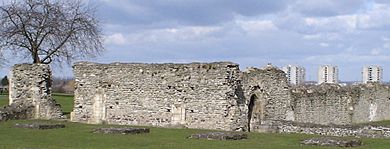Roger fitzReinfrid facts for kids
Quick facts for kids
Roger fitzReinfrid
|
|
|---|---|

|
|
| Royal justice | |
| In office 1176–1196 |
|
| Sheriff of Sussex | |
| In office 1176–1186 |
|
| Sheriff of Berkshire | |
| In office 1186–1189 |
|
| Personal details | |
| Died | 1196 |
| Spouse | Alice |
| Relations | Brother Walter de Coutances Brother or nephew John of Coutances |
| Children | Gilbert fitzReinfrey William |
| Occupation | Royal administrator |
Roger fitzReinfrid (who sometimes used the name Roger fitzReinfrey) was an important person in England during the Middle Ages. He lived until 1196. Roger worked for the king as a sheriff and a royal justice. A sheriff was like a chief officer in a county, keeping peace and collecting taxes. A royal justice was a judge who helped the king make sure laws were followed.
Roger probably came from a family of knights. He started his career working for a powerful nobleman. Later, he began to work directly for the king. His brother, Walter de Coutances, became a very important church leader, which likely helped Roger in his career. Besides being a sheriff in two different areas, Roger was also put in charge of several royal castles.
Contents
Roger's Family and Early Life
Roger had a brother named Walter de Coutances. Walter became the Archbishop of Rouen, a very high position in the church, from 1184 to 1207. Another relative was John of Coutances. John was either Roger and Walter's brother or their nephew. He later became the Bishop of Worcester. It's also possible that Roger had another brother, Odo of Coutances, who was a priest at Rouen Cathedral. Roger and his family were likely knights, which meant they were part of the noble class and served in the military.
Starting His Career
In 1161, Roger paid a tax called scutage for land he owned in Dorset. Scutage was a payment made by knights instead of serving in the army. From 1168 to 1178, Roger worked for a powerful man named Richard de Luci. Richard de Lucy was a very important official who served the king.
Later, Roger became a royal justice, working for the king directly. Another important person who helped Roger was Simon III de Senlis, who was an Earl. In 1175, Simon gave Roger some special land rights in London. Roger was often chosen by the king to be a judge. In 1176, King Henry II of England asked Roger to be a Serjeant-at-law. These were some of the first official lawyers in England. In 1177, Roger worked with Richard de Lucy to collect taxes and hear court cases in areas like Middlesex and Hampshire.
Working for the King
In 1173, Roger was given control of Windsor Castle. He kept control of Windsor until 1193, and in 1179, he officially became the castle's constable, which means he was in charge of its defense and management.
In 1176, King Henry II sent Roger and 17 other men across the country. They were called justicias errantes, or "wandering justices." They traveled in groups to hear court cases and make sure justice was served everywhere. This was after a set of laws called the Assize of Northampton was made.
King Henry II also made Roger the High Sheriff of Sussex in 1176. He held this important job until 1187. Roger was also the Sheriff of Berkshire from 1186 until King Henry II died in 1189.
After King Henry II died, his son Richard I became king. Richard went away on a Crusade, which was a religious war. While Richard was away from 1191 to 1193, Roger's brother Walter was put in charge of England. Because of his brother's high position, Roger was given control of more important castles, including Wallingford Castle, the Tower of London, and Bristol Castle.
Roger also gave land to a religious house called Launceston Priory. He did this for the well-being of his and his wife's souls. He also owned land at Ramsden Bellhouse. The church on this land was later given to Lesnes Abbey by Roger.
Roger's Family and Death
Roger's son, Gilbert fitzReinfrey, also became an important person who worked for the king. Roger had another son named William. William became a priest at Lincoln Cathedral. His uncle, Walter de Coutances, also made him an important church official in Rouen.
Roger's wife was named Alice. Roger fitzReinfrid died in 1196. His wife and mother were planned to be buried at St Mary Clerkenwell.
 | Janet Taylor Pickett |
 | Synthia Saint James |
 | Howardena Pindell |
 | Faith Ringgold |

